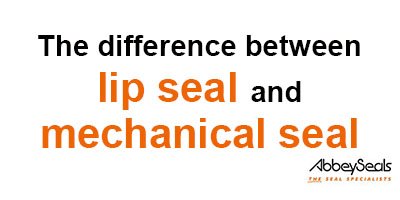The Difference Between Lip Seal and Mechanical Seal
The Difference Between Lip Seal and Mechanical Seal
The Difference Between Lip Seal and Mechanical Seal
12 May 2020

Lip Seal
Lips seal, oil seal or rotary/radial shaft seal’s sole purpose is to keep contamination out of the vessel while retaining the fluid within by closing off the space between the stationary and rotating parts (the shaft and whatever housing the liquid is in). They also confine pressure and separate fluids. These seals are often damaged or suffer wear and tear because of improper fitting or incorrect installation, so it’s imperative you have the right measurements and assembly when putting your equipment together. In order to properly function, they need to be in correct contact with the rotating counterpart. Hydraulic seals, axles and valve stem all need seals to function.
Mechanical Seal
A mechanical seal works on the same premise. When you seal the moving pump, you need to allow the rotating shaft to enter the area of the pump where there’s a lot of liquid, while also ensuring the pressurised fluid stays within the vessel. In most cases, a tiny amount of liquid, in the form of steam will evaporate through the mechanical seal. The seal between the pump vessel and the rotating shaft needs to be able to contain the pressure of the liquid being pumped and also manage the friction of the rotating shaft.
Their Qualities
Lip seals are made of nitrile, a material that functions well at temperatures of minus 4.4 degrees C up to 135 degrees C. Lip seals have excellent resistance to petroleum and hydraulic oils, and water. They are also very cost-effective. There are spring-loaded and non-spring lip seals, with non-spring lip seals being used for slower shaft processes. With mechanical seals, everyday wear and tear maintenance is reduced because the seals have inboard springs which make them self-adjusting as the faces wear down. Mechanical seals come in different forms depending on the application and the amount of pressure present, as well as the liquid viscosity and temperature. Mechanical seal material may consist of a hard material such as silicon carbide, ceramic or tungsten carbide and matched with a softer material like carbon.
Choosing the correct seal depends heavily on its application and your system needs. At Abbey Seals, we carry out extensive research to ensure we are providing you with durable, safe and appropriate seals for your business needs. We invest in state-of-the-art technology to create custom materials, and Xpress Manufacturing, if needs be. Contact our experts today, and we will be happy to answer any questions you might have about lip seals or mechanical seals.
